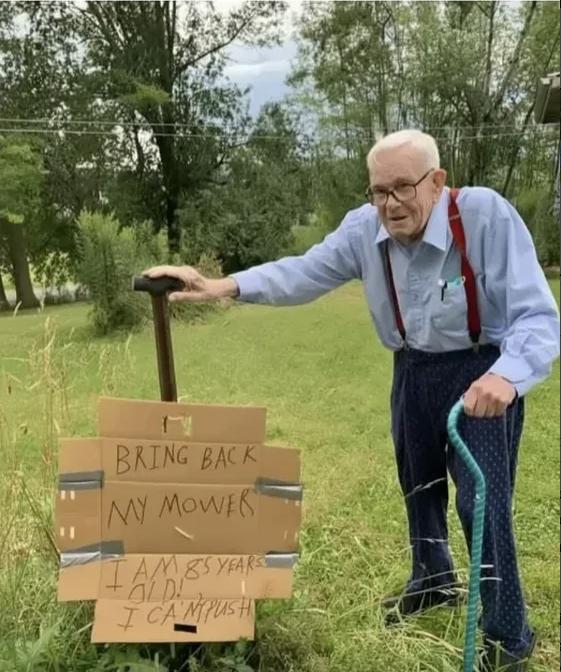
Gordon is eighty-five years old. He loved his riding lawn mower, loved the independence it gave him, loved being able to maintain his yard the way he’d done for decades. It wasn’t just about cutting grass—it was about dignity, autonomy, the simple pleasure of caring for your own property.
Then he went out of state to visit family for a few months. When he returned, his mower was gone. Stolen. Just taken from an eighty-five-year-old man who needed it.
Gordon was heartbroken. Not just about the financial loss, though that mattered. But about what the mower represented. At eighty-five, he couldn’t push a manual mower anymore. Without his riding mower, the yard work he loved—the independence he cherished—was suddenly out of reach.
So he made a cardboard sign and stood by his lawn: “Bring back my mower. I’m 85 I can’t push!”
The handwritten plea is visible in the photo, propped up beside him as he stands in his yard wearing a blue dress shirt, red suspenders, glasses, looking exactly like what he is—an elderly man who just wants his mower back so he can maintain his independence.
His daughter-in-law shared his story on social media. The post spread. And then one day, Gordon got a delivery.
An unnamed donor had bought him a brand new riding mower, presented by the local Sheriff department. Not a used replacement or a charitable hand-me-down. A brand new mower. The kind of gift that says: your dignity matters, your independence matters, you deserve nice things even though someone stole from you.
Gordon’s back to the yard work he loves. Back to maintaining his property. Back to feeling capable and independent at eighty-five.
The photo shows him with his sign, standing in his yard with green grass and trees behind him. He looks determined but also vulnerable—an old man holding a cardboard plea because someone took advantage of his absence to steal something he needed.
There’s something particularly cruel about stealing from elderly people. They’re often on fixed incomes, can’t easily replace things, and the theft represents more than just property loss. For Gordon, losing his mower meant losing independence, losing the ability to care for himself and his home, losing dignity.
But there’s something equally beautiful about the response. An unnamed donor saw the story and decided Gordon deserved better. Not just a replacement, but a gift that said: you matter, your life matters, your ability to maintain your independence matters.
The local Sheriff department participated in the delivery, adding official recognition to what was already a profoundly kind gesture. They’re saying: our community cares about you, we see you, you’re not alone.
Gordon is eighty-five years old and back to doing the yard work he loves. Back to feeling capable and independent. Back to maintaining his home the way he has for decades.
All because someone saw his cardboard sign and decided to help.
This story challenges us to consider how we respond when we see elderly people struggling. Do we scroll past their stories? Do we assume someone else will help? Do we rationalize that they’re old anyway and don’t really need things?
Or do we recognize that dignity has no age limit? That independence matters at eighty-five as much as at twenty-five? That losing your ability to care for yourself is devastating regardless of how many birthdays you’ve had?
The unnamed donor understood. They saw Gordon’s sign—”I’m 85 I can’t push!”—and recognized both the practical need and the emotional weight of that statement. They responded with generosity that restored more than just Gordon’s ability to mow. They restored his independence, his dignity, his sense that people still care.
Now Gordon rides his new mower around his yard, maintaining his property, feeling capable and valued. The cardboard sign is gone because he doesn’t need it anymore. Someone heard his plea and responded with extraordinary kindness.
At eighty-five, Gordon just wanted to mow his lawn. Someone stole that ability from him. A stranger gave it back.
That’s community. That’s compassion. That’s what happens when people decide that an elderly man’s independence matters enough to act.